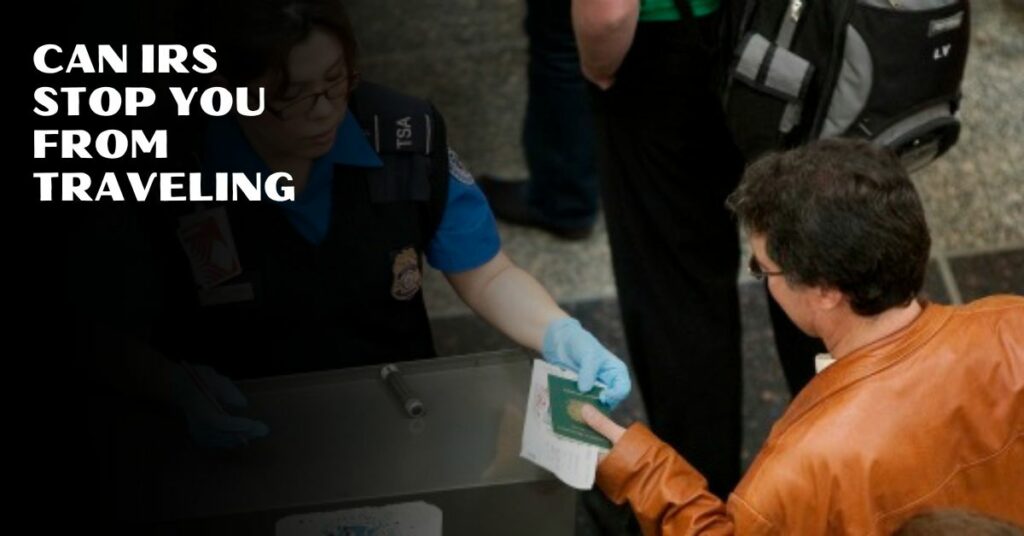Traveling the world is an exciting way to experience different cultures, create unforgettable memories, and expand one’s horizons. But can the Internal Revenue Service (IRS) stop you from embarking on your journey? It turns out that the IRS does have some legal power when it comes to restricting travel for taxpayers in debt. In this article, we’ll discuss what steps the IRS takes to prevent a taxpayer from leaving the country and how you can protect yourself if you owe back taxes.
The thought of being restricted from traveling due to owing money might seem like something out of a dystopian novel; however, it could become reality if certain conditions are met. Fortunately, there are ways to ensure your freedom while also paying off your debts. We’ll explore these options as well as discuss other aspects of international travel that may be affected by having unpaid taxes with the IRS.
Whether you’re planning an exotic getaway or simply want peace of mind, understanding how tax debts impact international travel will help make sure nothing stands between you and your dream vacation. Let’s dive into everything you need to know about “can irs stop you from traveling”!
1. What Does The Irs Have To Do With Travel?
When it comes to travel and the IRS, many people have questions. How is tax connected to our ability to get away from home? What are the laws we need to understand when planning a trip?
The Internal Revenue Service has an important role in regulating travel-related activities for U.S. citizens. The IRS can prevent you from traveling if there are outstanding taxes that remain unpaid. This means that even if someone else books your ticket or pays for your accommodation, if you owe back taxes then the IRS may deny you permission to leave the country until those taxes are paid off.
It’s therefore essential to be aware of any unpaid taxes before travelling abroad, as ignorance isn’t going to be seen as an excuse by the authorities! Knowing everyone’s rights and responsibilities when it comes to taxation will help keep trips running smoothly – and ensure freedom of movement remains intact. By understanding how travel and taxation intersect, travelers can take their adventures with confidence knowing they’re compliant with relevant laws and regulations.
2. Understanding The Laws Around Travel And Taxation
Navigating the laws around travel and taxation can be a tricky business. It’s important to understand how your taxes may affect your ability to travel. This is especially true if you’re planning on going abroad, as international destinations often have their own set of rules that must be followed.
The IRS has specific regulations regarding how much money you can take out of the country without paying an additional tax penalty. In addition, when you return from a foreign trip, there are certain documents you must present in order to prove that all applicable taxes were paid before leaving. Failure to do so could result in costly fines or even prosecution.
That said, it is possible for the IRS to stop you from traveling depending on what kind of financial situation you’re in at any given moment. Knowing this information ahead of time can help ensure your travels go smoothly and make sure nothing gets in the way of having a great adventure! But understanding why they may restrict your freedom is just as vital – let’s explore some reasons why the IRS might put restrictions on travelers next.
3. Reasons The Irs May Restrict Travel
“Where there’s a will, there’s a way.” This adage is especially true when it comes to travel and the IRS. While our subconscious desires for freedom are strong, in some cases, the IRS can restrict our ability to do so by utilizing tax liens or other means of restriction. Understanding why the IRS might stop us from traveling is important in order to make sure we stay on the right side of taxation laws.
The IRS may restrict your travel if you owe taxes that have not been paid. If you fail to pay back taxes owed, an unpaid federal tax lien can be filed against you which prohibits any money or assets owned by you being used as payment towards what is owed until such time as they are satisfied with full payment of your debt. Additionally, taxpayers who owe substantial amounts of money may also find that their passport has been revoked due to nonpayment of taxes which would prevent them from leaving the country without first paying off the debt.
Furthermore, those who are under criminal investigation for alleged tax fraud could face a travel ban from crossing international borders since this type of penalty can often be enforced prior to trial proceedings beginning. The same applies for anyone suspected of having committed serious violations involving their finances; even if no official charges have yet been made, a temporary suspension on their travels could still apply pending further investigations into the matter at hand.
It’s clear then that understanding how different types of restrictions imposed by the government can affect our ability to move freely around the world is key knowledge for all travelers – both foreign nationals and citizens alike – hoping to avoid running afoul with tax law regulations while abroad. Thus, knowing exactly where we stand concerning taxation issues before embarking on any journey could save us many headaches should anything unexpectedly arise along the way. From here we turn now to examining more closely ‘the tax lien and travel restrictions’.
4. The Tax Lien And Travel Restrictions
The IRS has the authority to restrict your travel if you have a tax lien. This is done by placing a levy on your passport, preventing it from being issued or renewed until the debt is paid in full. Although this may seem harsh, there are some instances where it can be beneficial for taxpayers who would otherwise not take responsibility for their outstanding debts.
In these cases, an individual’s personal freedom may be restrained temporarily but ultimately secured with full repayment of taxes owed and compliance with future filing requirements. The ability to have access to one’s own funds that were previously blocked due to nonpayment can also be invaluable when travelling abroad.
It can feel like an impossible situation when the IRS places restrictions on your passport. But understanding what steps need to be taken and having the right help makes all the difference. With patience and determination, it is possible to resolve even the most difficult travel restriction issues.
5. How To Resolve A Travel Restriction
Resolving a travel restriction is no easy feat, particularly when the Internal Revenue Service (IRS) has placed it on you. In fact, according to recent statistics, over 16 million Americans had an outstanding tax debt in 2019 alone – making this an increasingly common issue for many.
If you find yourself with a travel restriction due to unpaid taxes, there are several steps you can take to try and resolve the matter. First and foremost, be sure that all of your personal information is up-to-date with the IRS; if not, they may have sent notices or letters about the lien that never reached you. Additionally, it’s important to contact them directly if possible and attempt to negotiate a payment plan so that you can clear your debt quickly and efficiently.
Finally, seeking out professional assistance from either a lawyer or accountant who specializes in tax law issues can help ensure that everything is done correctly and within compliance of IRS regulations. This type of guidance could mean the difference between resolving the situation swiftly or being stuck with the restriction indefinitely. Taking these proactive measures will give you peace of mind as you move forward towards financial freedom.
6. What To Do If You Cannot Resolve The Issue
Riding the roller coaster of travel restrictions can be a daunting task. Navigating this bureaucratic terra incognita is like walking through an unfamiliar labyrinth – you never know what might crop up at any given turn! If you find yourself unable to resolve your issue, fear not; there are still steps that can help make the journey smoother.
First off, if time allows it, contact your local IRS office or representative and explain the situation in full detail. They may have insight into how best to proceed with getting around the restriction, and they may even present options unavailable through other channels. Additionally, staying organized and keeping track of communication between all parties involved can go a long way in helping sort out your dilemma. As the saying goes: “A place for everything and everything in its place”!
Finally, when all else fails, consider enlisting professional assistance from experienced tax attorneys or accountants who specialize in resolving such issues. With their expertise and knowledge of federal regulations behind you, these experts can often provide invaluable advice during the resolution process without breaking the bank on legal fees.
There’s no doubt about it: understanding how to navigate travel restrictions requires some perseverance and patience. But by following these tips, hopefully you’ll feel much more confident knowing exactly what action needs to be taken next before taking flight again!
7. What You Need To Know Before Traveling Again
Did you know that the average American takes 4-6 trips a year? As much as we all love to travel, IRS problems can put a major damper on our plans. If you’ve been dealing with an issue that prevents you from traveling, it’s important to take steps now so your future trips won’t be in jeopardy. Here’s what you need to know before hopping on the next plane or booking another cruise.
First and foremost, if there is an unresolved tax debt hanging over your head, make sure that it is taken care of before attempting any further travels. You may want to contact the IRS directly for help understanding how to settle this debt and get back into good standing with them. In addition, if the situation calls for it, consult a professional about strategies for resolving such disputes quickly and efficiently.
Next, consider doing some research into other countries’ policies regarding people who have previously had issues with their taxes when entering those countries. Depending on where you plan on traveling, they could potentially deny entry based off of these past occurrences. It would also be wise to look into whether certain destinations require additional paperwork or special permits due to complicated tax history within U.S borders; having all necessary documents ahead of time will alleviate stress at passport control checkpoints and ensure smooth sailing throughout your journey!
It may have felt like a long road getting back in the government’s good graces but being proactive and informed will greatly improve your chances of enjoying worry-free vacations in the future. With proper preparation, travelers with prior run-ins with the IRS will still be able to experience thrilling adventures abroad – just remember to pack extra copies of important documentation!
Frequently Asked Questions
Can I Travel While On A Payment Plan With The Irs?
Navigating payment plans with the IRS can be a tricky process, and many taxpayers wonder if they’re allowed to travel while on one. The good news is that you absolutely can. Here’s what you need to know:
• Payment plan agreements are flexible, so there’s usually no reason why travelling should be off limits
• If your current payment agreement does not allow for travel, you may be able to request an amendment
• Taxpayers who owe more than $50,000 in taxes or have filed offers-in-compromise will require additional authorization from the IRS before being allowed to travel
• You must continue making payments as usual during any time away from home; missing payments could result in defaulting on the agreement
• In some cases, travelers may also need proof of their tax compliance status when crossing borders or entering certain countries
When it comes to traveling while on a payment plan with the IRS, preparation is key. Make sure you understand all of the details associated with your particular situation first; this means knowing how much you owe, which form(s) were used to report income, and whether special permission is required ahead of time. This information will help ensure uninterrupted travels and peace of mind! It’s important to remember that by staying aware and proactive about meeting obligations according to your agreed upon terms – including paying fees and filing returns – can provide greater freedom down the road.
Can I Travel Abroad While I Am In Debt To The Irs?
Traveling overseas can be a great way to explore the world, while also taking much-needed time away from the hustle and bustle of everyday life. But if you’re in debt to the IRS, it’s important to know whether or not that affects your ability to travel abroad.
The answer is yes – unpaid taxes will affect your ability to travel internationally. The U.S. government has access to many international databases that contain information on tax debts owed by citizens traveling outside of the country, so they are able to determine who owes them money when someone tries to leave the United States.
If you owe back taxes to the IRS, then there may be complications for you when trying to depart for other countries. In some cases, travelers have been stopped at customs and prevented from leaving until their tax issues were resolved with the IRS. As such, it is important for those owing money to stay up-to-date on payments and take care of any outstanding tax obligations before planning an international trip.
Can I Travel To A Different State If I Owe The Irs Money?
Traveling can be an exciting experience, but it’s important to make sure your finances are in order before heading out. If you owe the IRS money, this is especially true as there could be serious legal implications if you travel across state lines or abroad.
When it comes to owing the IRS back taxes, it’s important to keep in mind that the government may have restrictions on where and when you can travel. The best way to find out for sure is to contact the IRS directly and ask about any potential restrictions regarding traveling within the US or internationally.
It’s also a good idea to get up-to-date information from other sources too, such as online forums or financial advisors who specialize in tax debt management. This will help ensure that you know all of the rules and regulations surrounding traveling while having unpaid taxes with the IRS.
TIP: Even if you don’t owe money to the IRS right now, remember that filing your taxes properly each year is essential for avoiding complications down the road – like not being able to travel freely! Take the time to understand how different types of debts might affect your ability to move around domestically or overseas.
Does The Irs Have The Power To Physically Stop Me From Traveling?
When it comes to the IRS and travel, many of us may feel a sense of trepidation. We’ve heard stories about people being stopped from traveling due to owing money to the IRS, so we want to know: does the IRS have the power to physically stop us from travelling?
The short answer is no. The IRS can’t just show up at your door and tell you that you’re not allowed to go on vacation or visit family out of state. However, they do have other measures in place for those who owe them money. For example, if you owe back taxes, the agency can put liens on your property as collateral until you pay what’s owed – including any penalties or interest accrued during this time. They could also seize assets like cars and bank accounts in order to get their money back.
So while the IRS may not be able to literally block you from boarding a flight or entering another state, they certainly have leverage when it comes to collecting delinquent payments. Knowing how much you owe and staying current with payments is essential for avoiding these kinds of scenarios altogether – giving peace of mind in knowing that your freedom won’t be compromised because of unpaid taxes.
Does The Irs Have To Notify Me If They Are Restricting My Travel?
Traveling is a fundamental part of life, and the ability to do so freely should not be taken for granted. Unfortunately, the IRS has the power to restrict your travel if they believe you are in violation of their rules or regulations. The question then becomes – does the IRS have to notify me if they decide to limit my freedom?
The answer is yes. In order to protect its citizens’ rights, the government requires that taxpayers receive proper notification when an action such as this will take place. This notice must provide details about why your travel was restricted and how long it will last. Additionally, there may be steps outlined on how to appeal any decision made by the IRS regarding restriction of travel privileges.
Fortunately, having your travel limited doesn’t necessarily mean you won’t ever be able to leave again – provided you follow all instructions given in the notice from the IRS. It pays off to know what rights you have and make sure that they are being respected at all times!
Conclusion
In conclusion, while it may feel like the IRS has a tight grasp on your life, you can still travel. It is important to remember that they are unable to physically stop you from traveling unless granted permission by a court of law. If they do decide to restrict your travels, chances are they will notify you beforehand. Ultimately, if you’re uncertain about whether or not the IRS will allow you to travel due to owing them money, then it’s best to reach out and ask for clarification first.
Imagining yourself in another country despite being in debt with the IRS or taking a road trip across state lines can be liberating; there is so much beauty outside our usual stomping grounds we have yet to explore! With compliance with the payment plan set up between us and the IRS, we can make sure any restrictions don’t apply. Even though taxes might seem daunting at times, I’m here to remind us all that nothing should hold us back from exploring this beautiful world we live in.
So don’t let fear keep you from experiencing new places and cultures – just remember when planning trips abroad or within your own country while under an IRS payment plan – check in with them first before booking those tickets!

Meet Michael Graham, the main author of SeekTraveler.com. With a wanderlust that knows no bounds, Michael has traversed more than 30 countries across the globe. From sun-soaked Caribbean islands to the ancient marvels of Europe and the captivating charm of Japan, he has witnessed the wonders of diverse cultures firsthand. Michael’s in-depth knowledge and contagious enthusiasm for travel will inspire you to pack your bags and embark on your own extraordinary journey.



